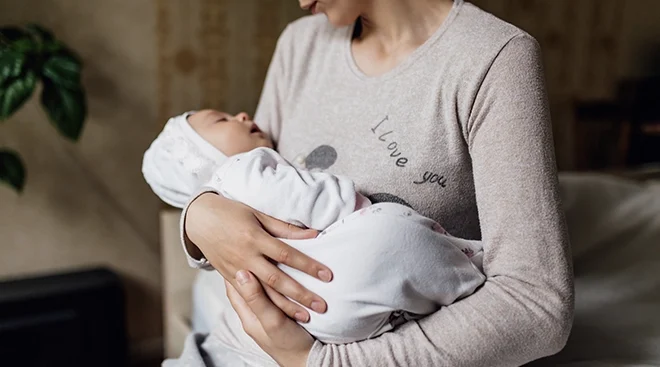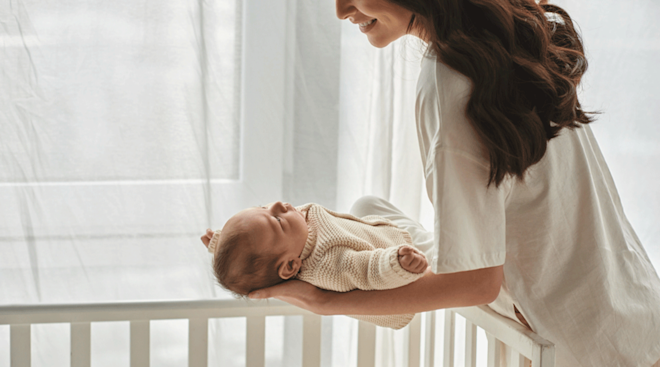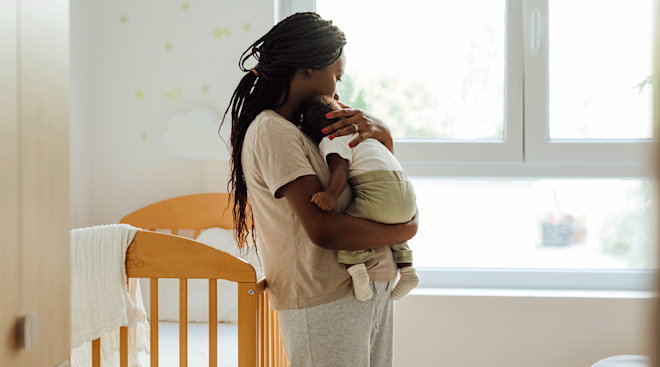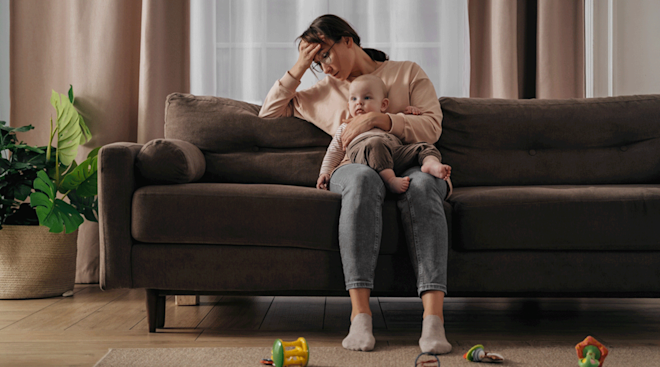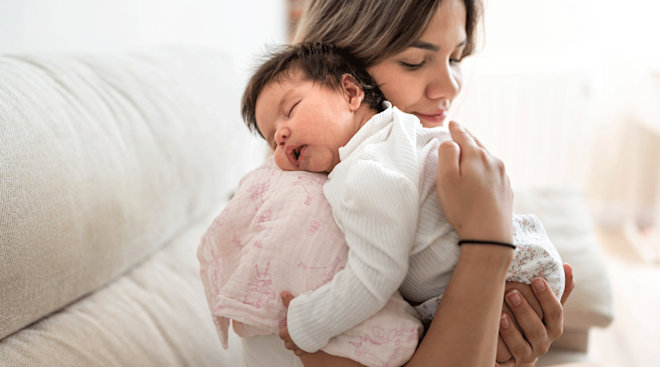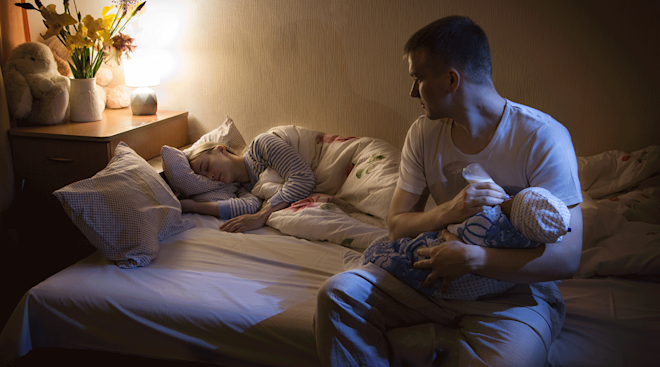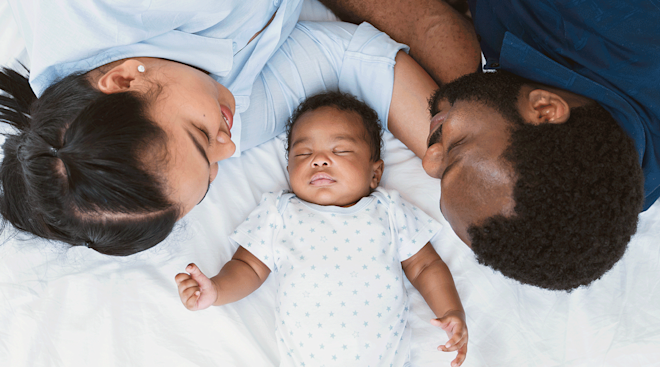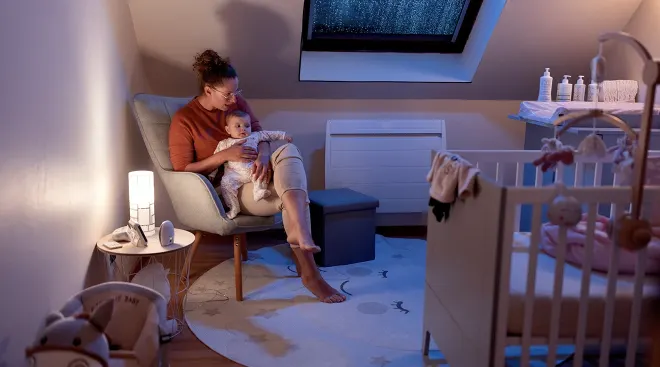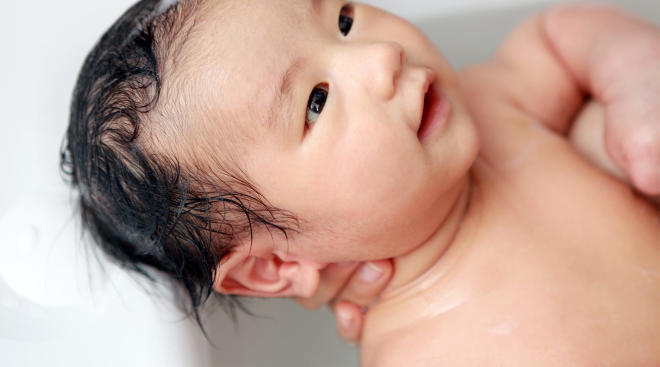What to Do if Baby Only Sleeps When Held
Holding your precious newborn in your arms is the ultimate reward after a long and exhausting nine+ months of pregnancy. Nothing fills your mama heart with joy quite like watching those tiny eyelids flutter as you cradle your little love. (And those sleepy sounds give you all the warm and fuzzies!) You enjoy cuddling that snoozing cutie of yours—and they love it too. But let’s be honest: It’s not always a practical solution for naps and bedtime. Wondering what to do when baby only sleeps when held? You’ve come to the right place. We’re sharing helpful tips, plus insight as to why they’re most comfortable this way. Read on to learn ways to gently transition your sleeping beauty to their own designated space.
“Baby will only sleep in my arms.” We’ve heard it before, and you’re not alone. It’s a common declaration from new parents—and there are a few key factors at play. From the first moment you snuggle them after birth, baby feels most at ease in your arms. Biologically, the fourth trimester is a huge developmental time frame for newborns, as they adjust to life outside of the womb, explains Christine Brown, founder of Bella Luna Family, a consulting company that helps parents with child sleep, behavior and potty training. “So in the early days, it’s a necessity to hold our babies for sleep—at least some of the time—to give them the closeness and security they need.” But things gradually start to change, and eventually, there are other reasons why baby will only sleep when being held.
Learned behavior from the womb
Baby spent nine+ months in the womb, enjoying the cozy quarters and ambient sounds and surroundings. It’s only natural for them to crave the creature comforts they became so accustomed to. “As /[newborns] grow and develop, so does their calming reflex. The soothing sensation in the womb, and the imitations of this outside of the womb, trigger this reflex—hence, a baby having a preference for being rocked to sleep,” explains Courtney Zentz, CLC, founder of Tiny Transitions, a pediatric sleep-coaching agency based in Philadelphia.
If you allow baby to sleep in your arms too much, while rocking, bouncing and shushing—all things that feel natural for parents—your little one is less likely to learn the skills required to fall asleep on their own. Though it’s well-meaning, this can cause baby to wake between sleep cycles looking for the motion, which leads to more overnight wakings and, often, short, broken naps, says Zentz.
Falling asleep while feeding
When baby is looking to nurse or bottle-feed, it’s only natural to tend to their needs. But hunger may not be the only reason they’re asking to be fed. New parents are sometimes unaware of ideal wake windows, which change as baby ages. As a result, baby quickly becomes overtired and hungry, and doesn’t even get through a full feeding when the soothing, sucking sensory input causes them to fall asleep, explains Zentz.
Reflux or colic
If baby has difficulty settling in for a snooze, you may be tempted to simply hold them until they fall asleep. But silent reflux or colic could be the culprit. If you think reflux could be hindering their ability to sleep independently, try holding baby upright for about 20 minutes after a feeding before placing them into their crib, advises Zentz.
Supported sleep becomes a habit
If no health issues exist, sleeping in your arms has likely just become a habit. “Sleep is a skill—and how a baby learns to fall asleep is how they expect to fall asleep every time,” notes Zentz. “If baby has spent six months [being] rocked to sleep, and you suddenly want them in the crib, like any new skill, there will be a learning curve,” she adds.
Try not to stress if baby will only sleep when held. Remember, this stage with your little one is fleeting, so there’s really nothing wrong with slowing down the pace of life, clearing your schedule and snuggling down. Most parents can agree that these aren’t moments they’ll regret.
Of course, life gets busy, and you may need baby to sleep independently. What’s more, establishing healthy sleep habits can help set you and your child up for better nights as they get older. In other words: It’s okay if you want to extend this time with baby, but it’s also totally acceptable to be ready for the next stage (and a bit more solo time). If you’re still undecided as to whether you should allow baby to sleep in your arms, here are some things to think through.
Pros and cons of allowing supported sleep
The biggest benefits of having a baby who will only sleep when held are clear: For starters, they’ll actually get solid sleep. What’s more, you’ll both enjoy some quality bonding time.
On the flip side, always holding baby while they sleep can inadvertently form an association that may be harder to break as they get older. “Most parents find it to be an unsustainable practice because their sleep is impacted, especially at night, leading to sleep deprivation. During the day, they aren’t able to get anything done while their baby is sleeping,” says Brown. Moreover, there’s the risk of a parent falling asleep while holding baby and then accidentally dropping them. Plus, we all know that naptime is prime time for parents to catch up on life, eat a sandwich, drink a cup of coffee (perhaps while it’s still warm!) or enjoy some self-care.
So how do you know when it’s time to stop allowing baby to fall asleep while you’re holding them? “When babies start to intentionally smile at you—around 6 to 8 weeks—this is a sign that it’s time to try to start having baby nap independently,” says Brown. At this stage, babies become more awake and social. They develop the ability to form connections and follow cues. Beginning to teach baby how to sleep independently becomes important, so they can learn the skills they need before the dreaded 4-month sleep regression. Moreover, Zentz adds that by 12 weeks, baby should be settling to sleep independently, and you should drop any dream feeds to allow for the natural development of baby’s sleep cycles.
Don’t worry—it doesn’t need to be an overnight change. If baby only sleeps when held, we’ve got tips to help free up your arms and give you some time back.
Make it a gradual transition
Start with one nap a day. Lay baby down in their crib or bassinet while they’re drowsy but still awake. This creates diversification of a skill that you can build on over time, says Zentz.
Adjust the order of naptime events
Try feeding baby first, then read a book together in an upright position. Finally, lay baby down in their crib, advises Zentz.
Offer gentle reassurance
Try offering some gentle but not overly stimulating comfort until baby falls asleep. Hold their hand or place your palm on their chest, suggests Zentz. “Then, each day, gradually wean off the amount of support as their skill set of independent sleep sharpens.”
Give yourself grace
The learning curve is real—and so are baby sleep challenges. Don’t be hard on yourself during this transition. Baby will eventually sleep out of your arms. In the meantime, try to enjoy the extra snuggles, celebrate the small wins and be gentle with yourself when things don’t go as planned. Remember, there’s always the next nap.
Please note: The Bump and the materials and information it contains are not intended to, and do not constitute, medical or other health advice or diagnosis and should not be used as such. You should always consult with a qualified physician or health professional about your specific circumstances.
Plus, more from The Bump:
Christine Brown is the founder of Bella Luna Family, a consulting company that helps parents with child sleep, behavior and potty training.
Courtney Zentz is the founder of Tiny Transitions, a pediatric sleep coaching agency based in Philadelphia.
Learn how we ensure the accuracy of our content through our editorial and medical review process.
Navigate forward to interact with the calendar and select a date. Press the question mark key to get the keyboard shortcuts for changing dates.
































